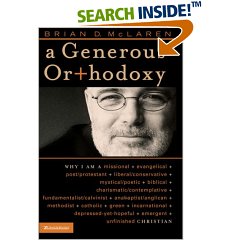A Generous Orthodoxy

Summarize:
Brian McLaren’s book “A Generous Orthodoxy” spends more time introducing, qualify and summarizing its purpose then any book I have ever read. Chapter 0 is essentially an invitation to take the book back, but serves to illuminate many of McLaren’s assumptions about Christianity and the Church. The word generous is used to describe a posture toward others involved in the pursuit of Orthodoxy. Orthodoxy is then defined as “right thinking” in reference to truth, doctrines and theologies. McLaren suggests that along side a pursuit of Orthodoxy an Orthopraxy (right practice) of creedal Christianity should be a primary concern. In the pursuit of right practice (Orthopraxy) people lives and beliefs will be formed by the truth and glory of God. The book illustrates the short falls of Traditional Orthodoxy (right thinking), and how it has not led the church to its goal of unity and love. Each chapter has a unique voice and character contributing to a thesis of generosity and right practice among diverse doctrines and thinking.
Observe:
“A Generous Orthodoxy” acts as a set of glasses for those who move and interact only within their tradition. There is a chapter in the book for almost every major movement in Christianity. The movement is affirmed for their unique and valuable contribution and then challenge to see the weaknesses in their approach. Unlike a frontal attach that would cause people to become defensive, McLaren uses positive stories from alternative traditions to help people see outside their boxes and buildings. Few other writers have dared to identify themselves by so many names: evangelical, liberal, conservative, baptist, fundamentalist, charismatic, contemplative and catholic. Most other works of this kind have attempted to appear objective and removed from the traditions they are describing.
Believe:
McLaren seeks to lead people to an acceptance of both their commonality and diversity. He believes providing understanding will produce a love and appreciation for people of other traditions. He has made the assumption that a Christian who thinks they are finished and right is a dangerous and often narrow minded person. McLaren leads his readers to a place of believing and experiencing a God who is experienced in different ways at different times and places. The chapter on “The Seven Jesuses I have known” illustrates this belief that our relationship and knowledge of Jesus is changing and emerging. Each understanding of who Jesus was had a measure of truth and a focus (sin, healing, teaching ect…), but living with one focus always led to a problem or distortion of the whole person. As one form of Jesus breaks down is allows a person to experience another measure of who Jesus can be in their life and in the world.
Doubt:
I found myself excited, educated and inspired by McLaren’s work to create Christians who are more generous with one another and God. I question weather this journey in greater understanding will produce an atmosphere of practice or apathy. I am interested to know what a Generous Orthodoxy church would look like and practice. In politics the moderate position has been unable to inspire the masses to its mission and purpose. It seems possible that church communities without a strong sense of identity and mission apart from the holy, catholic, apostolic, “Generous Orthodoxy” church will lose momentum and commitment.
Assess:
McLaren makes the correct observation that Orthodoxy is often hostile to those outside of its boundaries. Orthodoxy can be used to abuse as easily as it can be used to encourage and unite. I believe he is correct in pushing the church to believe generosity and orthodoxy should and can be combined. Many would rightly argue that the Holy Spirit is the protector of the church and orthodoxy. This should not cause us to assume that the church has always had the right definition of orthodoxy. McLaren creates a beautiful picture of the church shutting the door to the Holy Spirit, and the Spirit entering back in through the window. The Holy Spirit was at work in the early church guiding them towards truth. The Holy Spirit is still working to bring us into all truth. A Generous Orthodoxy is the consistent practice of humility, charity, courage, and diligence. This does not eliminate the existence or need for doctrines. Doctrines that do not find their root in the statements of the Apostles and Nicene creeds should not be seen as primary or essential for Christian salvation. Secondary doctrines may have importance within a particular denomination, but not as a measuring stick for Christian Orthodoxy. The doctrines required and essential for salvation in Christian orthodoxy can be found in the creedal statements of the Apostles and Nicene creeds. In the final analysis a Generous Orthodoxy is to be caught up in the practice of loving God and all of his creation.

0 Comments:
Post a Comment
Subscribe to Post Comments [Atom]
<< Home